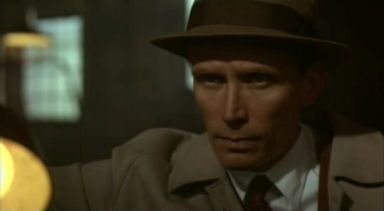 David Cronenberg’s Naked Lunch is not William S. Burroughs’ Naked Lunch and god only knows what the old gentlemen junkie made of this grotesque—where reptiles spill glycerin gel from the hollow tips of their vestigial head-tendrils—where fact and fiction recombine like RNA mixed in some unholy juice machine of a Canadian’s mind. Hard to find a mind so filled with the temptations of the flesh. Flesh stretches and squelches and screams through the smoke nights of Vancouver lights in the sky pink shale colors of rail and light and tonight we find David Cronenberg’s Naked Lunch. No more feeling than a crab’s eye on a stalk.
David Cronenberg’s Naked Lunch is not William S. Burroughs’ Naked Lunch and god only knows what the old gentlemen junkie made of this grotesque—where reptiles spill glycerin gel from the hollow tips of their vestigial head-tendrils—where fact and fiction recombine like RNA mixed in some unholy juice machine of a Canadian’s mind. Hard to find a mind so filled with the temptations of the flesh. Flesh stretches and squelches and screams through the smoke nights of Vancouver lights in the sky pink shale colors of rail and light and tonight we find David Cronenberg’s Naked Lunch. No more feeling than a crab’s eye on a stalk.
This is a conscious pastiche—A love note to the dead—Dead and gone is Bill Burroughs—1914-1997—Fellow veteran of Missouri—Graduate, Harvard, Class of ’36—Migrant to New York City in 1943 where he met a pair of Columbia University students named Allan Ginsberg and Jack Kerouac through their mutual friend, Lucien Carr—Carr went on to stab a man to death and dump his body in the Hudson river—Gray flannel suit floating down stream to wash up on a toxic New Jersey shore amidst the Devils and the Smog Monsters—And the Hippos Were Boiled in Their Tanks—Kerouac and Ginsberg enjoyed better fates, dying young, but famous, their names written across the sky—Generations of hobos, tramps, beatniks and hipsterfucks following in the suede shoe footsteps.
It was Kerouac who first suggested Burroughs write—William detested the practice—Gave it up after High School and a bad experience working for the St. Louis Post Dispatch—(Walking police beat as 1920s cops in chin-strapped Bobby hats fish drowned children out of the Mississippi, children of the earth swallowed and spat up by the Father of Waters)—It was Kerouac who first suggested “Naked Lunch” was “the only title” for the great insanity of text Burroughs hammered out in his Tangier apartment over four years, beginning in 1954, the First Year of Gojira—
Ginsberg and Kerouac helped Burroughs edit these text into a semblance of readability—The Result is a Beatific Experiment in literary surrealism—A great middle finger raised at the stifling formalism of New Criticism (a meaningless bunch of nerds who’s opinions were popular at that time, particularly in New York—particularly at Columbia)— It what Burroughs rightly called the Word Horde—choking sound of mind and image—red fire lines dancing, sigh across skies—towers open fire—image and freezing cold idea, isolated, alone, one idea at a time you scoot your way into the book like up to a classy dame at the Wet Bar and—Bang—smacks you like a bad date—No means “No”—the book smacks you like six bad dates all strung together, a pearl necklace of offended womanhood—scatological and insensate—not for children or the faint of heart—Abandon All Hope—All is Lost, is Lost—You are an Alice and the book is your Wonderland—the slick, sick shifting Underland of one sad, St. Louis junky’s heart—Stream of consciousness cut-up prose is excised whirling across the vale of consciousness—Rightly considered unfilmable—Until a cold wind blue from the frozen North—
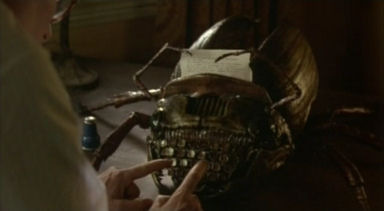 David Cronnenburg’s Naked Lunch is not William S. Burroughs’s Naked Lunch. I believe I mentioned that. Fresh from the horror “Renaissance” of the 80s, the Canadian Wunderkind decided to film the unfilmable. God only knows why. I have a theory: he got an idea. Forget Naked Lunch the book. The red, dripping heart of the book lies in its ability to completely subsume the consciousness of its readers, deriving power from the vivid imagery of Burroughs’ imagination and the strange ability of the human mind to read meaning into almost anything, no matter how grammatically incorrect it might be. Noam Chomsky’s famous “meaningless” sentence, “Colorless green ideas sleep furiously,” would fit right in Naked Lunch. This effect cannot be duplicated in moving pictures. It is entirely dependent upon Words.
David Cronnenburg’s Naked Lunch is not William S. Burroughs’s Naked Lunch. I believe I mentioned that. Fresh from the horror “Renaissance” of the 80s, the Canadian Wunderkind decided to film the unfilmable. God only knows why. I have a theory: he got an idea. Forget Naked Lunch the book. The red, dripping heart of the book lies in its ability to completely subsume the consciousness of its readers, deriving power from the vivid imagery of Burroughs’ imagination and the strange ability of the human mind to read meaning into almost anything, no matter how grammatically incorrect it might be. Noam Chomsky’s famous “meaningless” sentence, “Colorless green ideas sleep furiously,” would fit right in Naked Lunch. This effect cannot be duplicated in moving pictures. It is entirely dependent upon Words.
Words force thought to happen. They force the interior voice of the reader to sound them out, drowning out whatever inane chatter might otherwise be ringing around in there. Words are “there” in a way that images (film) can never be. What is film but twenty-four frames a second, whizzing by you at the speed of light? Now you see it, now you ___’_.
So forget all that. Cronenberg’s idea was a simple one—and logical in its way. Unfortunate, then, that it resulted in such a terrible movie, not for everyone. Those tenacious enough to work through either book or film run the risk of emerging from the experience feeling…empty. “What?” you’ll asked the closing credits, “Was that’s it? Really? That didn’t make any goddamn sense. What the hell was the point of that, Cronnenberg?”
Meet Bill Lee, an exterminator in New York City, 1954. One day, Bill runs out of “bug powder” in the middle of job. Thorough investigation (i.e., listening to his best friends make snide remarks) reveals that Bill’s wife, Joan (Judy Davis), is the culprit: she’s started shooting the stuff. Not only does it kill roaches by the score, it apparently bequeaths a very “literary high” to humans. Intrigued, Bill tries it out.
Jump cut to an indeterminate number of days later and Bill’s cornered by two plain-clothes cops. “You know,” one cop says during the ensuing interrogation, “I think we got a bug around here somewhere.” From a box he pulls a hand-sized, rod-puppet beetle with dull emerald eyes and a yawning orifice ‘twixt its wings. “We’ll be back later to see how it worked out, kiddo,” the other cop says as they lock the door behind them.
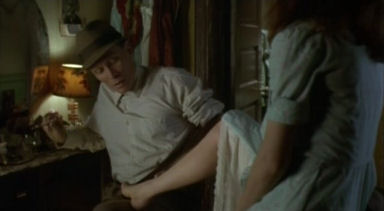 “William Lee,” the bug’s orifice intones, “I have arranged all this just so I can have a moment alone with you. I am your case officer…you are my agent….Come, come, Mr. Lee. You don’t have to play dumb with me…Say, Bill, do you think you could rub some of this powder on my lips?”
“William Lee,” the bug’s orifice intones, “I have arranged all this just so I can have a moment alone with you. I am your case officer…you are my agent….Come, come, Mr. Lee. You don’t have to play dumb with me…Say, Bill, do you think you could rub some of this powder on my lips?”
Bill agrees. The bug goes on to tell him Joan is “not really your wife. She is an agent of Interzone Incorporated. You must kill her…it must be done this week. And it must be done real tasty. ” Interzone being “a notorious free port on the North African coast, a haven for the mongrel scum of the Earth, an engorged parasite on the belly of the West.” Bill questions why Joan would work for such a “two bit” outfit? “But who says Joan Lee is a woman? In fact, who says she’s human at all?”
Offended by the association (or perhaps just freaked-the-fuck-out), Bill flattens the bug with his shoe-heel, breaks through the interrogation room’s improbable glass door and flees back to Joan. During foreplay she makes the mistake of asking, “Say, Bill, would you rub some of this powder on my lips?” And so her fate is sealed.
But first, Bill must lose his job and get caught trying to lift the gear off a fellow exterminator, so desperate is he for a last little taste of the powder. His potential mark directs him to the kindly Dr. Benway (Roy “Sheriff Brody” Scheider, obviously having more fun than he’s had in years). Dr. Benway sends Bill home with a vial of the “true black meat,” the powdered flesh of “an aquatic Brazilian centipede…it shuts down the brain’s response to the bug powder, that’s all.” Rii-iiight. Dr. Benway demonstrates, providing unintended insight into just what might be going on here. “The black will completely disappear, no smell, no discoloration…its’ like an agent. An agent who’s come to believe his own cover story. But he’s there. Waiting. In a larval state.”
Someone really should talk to David Cronenberg about his insect obsession.
Back at the apartment, Bill finds Joan and their obviously-Kerouacian friend, Hank (Nicholas Campbell), fucking on the couch as Allen Ginsberg…excuse me, Martin Noname (Michael Zelniker) reads poetry over them. Seemingly unperturbed, Bill goes into the next room, shots up some bug powder, fixes up Joan, and announces, “I think it’s time for our William Tell routine.”
Joan obediently recreates a scene from the life of William S. Burroughs, placing an empty glass on her head. Bill shoots. The glass hits the floor whole and healthy, his wife decidedly less so.
Fleeing the crime scene, Bill drifts through New York, blowing into a seedy, waterfront dive. There, a criminally-good looking man asks him if he’s a “fagot,” and introduces him to a six-foot tall, green skinned, three-fingered creature identified only as “Mugwump.” Mugwump provides Bill passage to Interzone and suggests he buy a Clark Nova typewriter because, “it has mythic resonance.” Bill’ll need the writing machine for his reports from the ‘zone. “Handwriting is not considered professional…Don’t leave out any of the tasty details…The little round hole in the forehead, the surprised look in her eyes…”
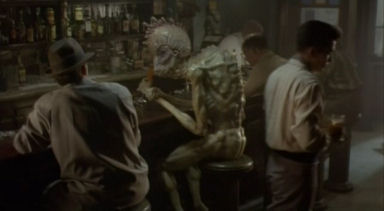 And off we are to Tangier…or Interzone. Where Arab coffee houses overflow with stuffy men in business suits who pound away at typewriters, glaring at each other over the rims of their cups. Where Bill, working through several degrees of separation, eventually falls in with a dapper American named Tom Frost (played by an Englishman named Ian “Bilbo Baggins” Holm) and Tom’s wife…Joan (Judy Davis, again).
And off we are to Tangier…or Interzone. Where Arab coffee houses overflow with stuffy men in business suits who pound away at typewriters, glaring at each other over the rims of their cups. Where Bill, working through several degrees of separation, eventually falls in with a dapper American named Tom Frost (played by an Englishman named Ian “Bilbo Baggins” Holm) and Tom’s wife…Joan (Judy Davis, again).
Bill’s continued use of bug powder, mixed with the true black meat, complicates things mightily, and I’ll give the movie this: it does a great job of never drawing a fine line between Bill’s “real” life and his hallucinations. He, and we the audience, are forced to accept or reject what his Clark Nova typewriter tells him when it suddenly comes to life and explains his mission as an agent…of what we’re never told (the Nova Police, perhaps?)…but at any rate, Bill is meant to infiltrate Interzone, breach its mysterious walls and somehow confirm the identity of its shadowy head-figure. Bill takes all this as a license to hang out with the Frosts, seduce Joan (with the aid of a little powder), and fall even further into the pit of debauchery and sin that was the North African coast of his particular time and place. Where too-handsome, too-clean Arabic youths with burnished rows of Hollywood-good teeth cavort and frolic amongst the rich detritus of Western civilization. A world of hustlers, gangsters and “fagitos,” closeted or not. A world where typewriters shaped like Mugwump heads secrete hallucinogenic compounds when they like what you’ve written. (And what junkie writer wouldn’t love a Christmas gift like that? Sure as hell help the monthly budget around here, let me tell you.) A world where humanity is (at best) a deceptive shell, hiding the vicious, insectile nature of apparently-harmless rich folks. A world where, as one of the movie’s epigrams (attributed to half-legendary founder of the Hashshashin, Hassan I Sabbah) puts it, “Nothing is true; everything is permitted.”
That is, everything you can sneak past the MPAA and still receive an R rating. And for all the hype and prestige that surrounds this picture, for all the love and craft and special attention paid to it, I can’t help but feel disappointed with the final, ill-conceived result.
First and foremost, the movie is too tame, especially given its subject matter. Trailers for this picture made much to-do over the fact that Burroughs’ Naked Lunch was originally banned in this country, even put on trial for obscenity in Boston in 1962. (The Massachusetts Supreme Court overturned the ruling four years later, ending one of the last major censorship battles in the history of the United States.) How ironic, the trailers mused, that such a book was now a movie, made to play in every public house from sea to shining sea.
Yes, and how unfortunate that the tenants of movie-making (particularly Hollywood movie making, circa 1991) required Cronenberg throw so much of the novel away, importing incidents from Burroughs’ life in order to give the film some semblance of a narrative. Burroughs’ did indeed shoot his wife in a drunken game of William Tell. (Luckily, if that’s the word, he did so in Mexico City, not New York City—Mexican law at the time allowing him to go free after serving only thirteen days in prison and paying a hefty brace of bribes.) He did indeed flee the Western Hemisphere for the “International Zone” of Tangier Morocco. While there, Burroughs sustained an affair with a Arabic boy named Kiki (which might or might not be the boy’s real name) whilst enjoying the live-and-let-die, do-what-you-feel-like attitude of the open port city, now vacant, vanished—where corruption flowered like crocuses in a forgotten dung heap. Reports of Kiki being eaten alive by a giant bug (disguised as a poncy English fop) are not as greatly exaggerated as one might first believe.
The point is Cronenberg set out to make a movie “based on the novel, Naked Lunch by William S. Burroughs.” Finding this impossible, he broke the novel down into its component parts and sowed true-life and half-truth events into a bookscript, creating a genre unto himself: the science-fiction-bio-drug-picture. With insects. Talking, secret agent insects that disguise themselves as typewriters
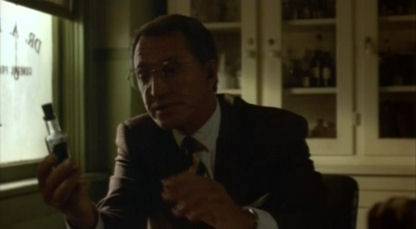 To my mind this inspires two question: if you wanted to make a bio-pic why not make a fucking bio-pic? Even a cursory glance at Burroughs’ life provides more than enough material. Or, going the other direction, there’s plenty of sci-fi/horror elements scattered through the texts. Why not tease those together and drag your audience into Interzone’s real Heart of Darkness? You’re already cherry-picking from the book as it is—why not go the full nine? Why pussy out when it comes to Middle America’s (or the Canadian equivalent thereof) need for a definite protagonist, or coherent storyline? Not that you couldn’t manufacture both from the material in the book. There’s no monolithic criminal organization in Burrough’s Interzone (at least, not to the degree presented in the film). Rather Interzone is a stage, set to stand for the modern world—a world torn by racism, sexism, and totalitarian dreaming, where evil is everywhere and there are no heroes left to save us—A world where, at best, we can only hope to expose Evil for what and who it is, expose the Apocalyptic projects (referred to as “Nova” in other Burroughs works) all extremists cradle to their breasts…and do it all without selling out, as frail, fallible human beings are want to do whether they admit it or not.
To my mind this inspires two question: if you wanted to make a bio-pic why not make a fucking bio-pic? Even a cursory glance at Burroughs’ life provides more than enough material. Or, going the other direction, there’s plenty of sci-fi/horror elements scattered through the texts. Why not tease those together and drag your audience into Interzone’s real Heart of Darkness? You’re already cherry-picking from the book as it is—why not go the full nine? Why pussy out when it comes to Middle America’s (or the Canadian equivalent thereof) need for a definite protagonist, or coherent storyline? Not that you couldn’t manufacture both from the material in the book. There’s no monolithic criminal organization in Burrough’s Interzone (at least, not to the degree presented in the film). Rather Interzone is a stage, set to stand for the modern world—a world torn by racism, sexism, and totalitarian dreaming, where evil is everywhere and there are no heroes left to save us—A world where, at best, we can only hope to expose Evil for what and who it is, expose the Apocalyptic projects (referred to as “Nova” in other Burroughs works) all extremists cradle to their breasts…and do it all without selling out, as frail, fallible human beings are want to do whether they admit it or not.
The movie mentions none of this, content to limit itself. This is Bill Lee’s story, and Bill is little more than a David Cronenberg’s protagonist—the director’s spy, temporarily inhabiting Peter Weller’s body (which turned down RoboCop 3 to do this —more’s the pity for RoboCop 3).
All of Cronenberg’s usual themes poke their heads up at some point—confused whack-a-mole concepts, no longer shocking because they’re instantly recognizable—the plastic, nature of reality—the mingling of organic and technological material—an almost-Victorian distrust of women which, when combined with the movie’s ambivalence toward homosexuality, amounts to a complete distrust of sex—(which is, like all physical processes, pretty fucking gross when you get right down to it)—the moral ambivalence to all that goes on, always careful to pass no judgments. All of which is fascinating in other contexts—The Fly—Videodrome—Good movies with stories arising organically out of Cronenberg’s pet themes—But in Naked Lunch he rudely grafts these themes onto a narrative structure that is not his—The story rejects them like donated livers, as Bill eventually rejects both of the movie’s shadowy organizations—talking insects and Interzone Inc. alike—Fuck ‘em both, he figures, going his own way into the strange, pseudo-Russian land of Annexia.
Unfortunately, this is a Hollywood movie. So it’s True Love that moves Bill to reject outside authority in favor of his dead wife’s doppelganger, Joan Frost. I admit, I’d do the same. Doesn’t make Bill any more likeable. (Consistency is nice!) Peter Weller’s likeable enough, but as with Leviathan, I can’t help but be distracted by the fact that I’m watching Officer Alex Murphy, Detroit Police Department. There’s Murphy tying off and shooting bug powder up his arm. What would your partner, Lewis, think if she could see you now, Robo? The script does nothing to help. Throughout the film Bill swings from gibbering horror to a blithe acceptance of his hallucinations (if that’s what they are).
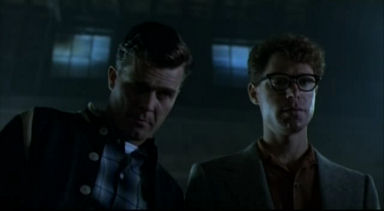 This is disconcerting given Cronenberg’s usual aplomb at showing ordinary people’s (often gross over-)reactions to absolutely insane situations. (Compare with Seth Brundle’s gradual [but entirely logical and thus believable and thus all the more unnerving] descent into human fly-transformation-induced-madness.) Unfortunately for Dave, there are no ordinary people in William S. Burroughs work, and what would seem like a logical wedding of director and subject becomes a crass, clanging, clunking, cacophonous mush of a film that leaves you wonder, What are all the things I could be doing instead of watching this? I could be writing a novel, you know.
This is disconcerting given Cronenberg’s usual aplomb at showing ordinary people’s (often gross over-)reactions to absolutely insane situations. (Compare with Seth Brundle’s gradual [but entirely logical and thus believable and thus all the more unnerving] descent into human fly-transformation-induced-madness.) Unfortunately for Dave, there are no ordinary people in William S. Burroughs work, and what would seem like a logical wedding of director and subject becomes a crass, clanging, clunking, cacophonous mush of a film that leaves you wonder, What are all the things I could be doing instead of watching this? I could be writing a novel, you know.
At least the cast looks like they’re having fun. Ian Holm is sufficiently creepy, if criminally underused. The Kerouac and Ginsberg figures are fun to have around—its nice to see the Beats assembled, like the superhero team they were. (Now, there’s a movie I’d enjoy…) Judy Davis has little to do in either of her roles—because Cronenberg Hate Women!–oh, wait, sorry, no, I mean—because the lack of active female protagonists is another unfortunate commonality of Cronenberg films. The characters of Interzone are all well played even if virtually irrelevant to the plot. This is all about Bill Lee and his unfortunate drug habit. Cronenberg insists we watch an hour and fifty minutes of that story and like it, by God.
Little possibility of that. This is one writer-director’s cheap bastardization of another writer’s work—As repulsive as a love note written in blood—Like its source material, the movie makes no objective sense, decaying like radioactive ore into eventual irrelevance—All of this is written in the style of the Beats, the first thought, the most primal, written first with minimal revisions. The final word: Naked Lunch is a boorish, incoherent waste of space that takes a long, lugubrious road to very pedestrian place. With a Twilight Zone twist-ending tacked on as a final surreal summation.
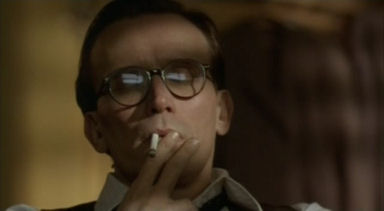

Totally disagree with you here. Naked Lunch is my favourite movie and everything you seem to dislike IMO makes the movie even better than the book. So DC inserted some of Burroughs life into the movie – you think he should have made a biopic because of that. Why? That argument doesn’t even make sense because why shouldn’t there be a mix of both an author’s work and the author’s life in a movie? There’s no rule against that. It’s pretty obvious that you would have preferred a movie that stuck closer to the book, but if you want that you have to make your own Naked Lunch movie.
And for the record, Burroughs himself liked very much what Cronenberg did there. You can of course still dislike the movie, but I’m afraid you’re pretty much alone with your opinion.
Best stoner movie of all time.
Which pretty much confirms my suspicion that you know cooler stoners than I do. (My crowd universally despised this movie – and I made them suffer through five seasons of MST3k.)
“tenants” of movie-making ?????
Yes.